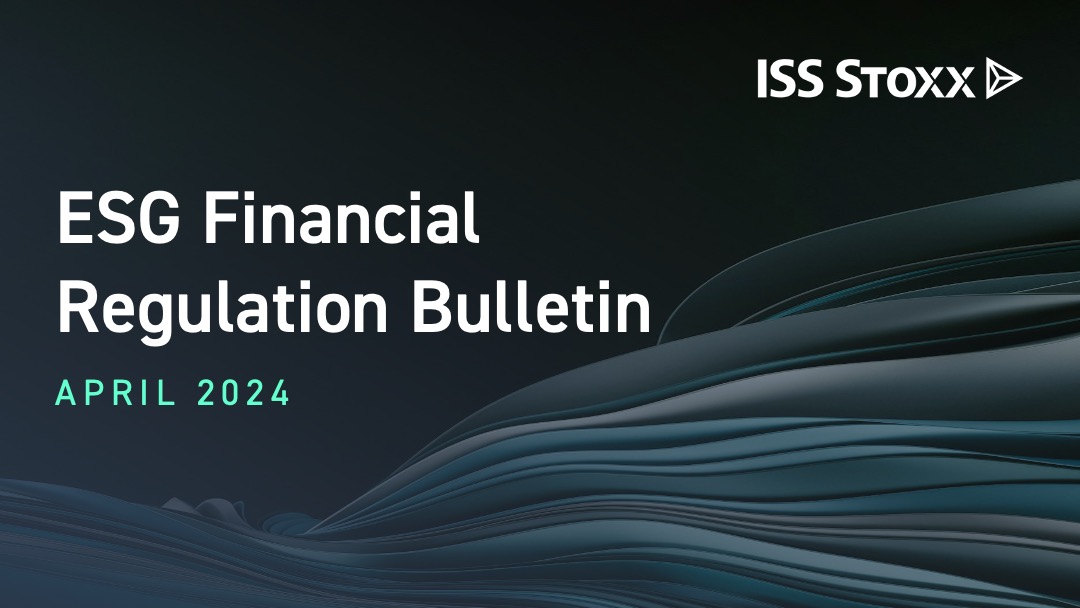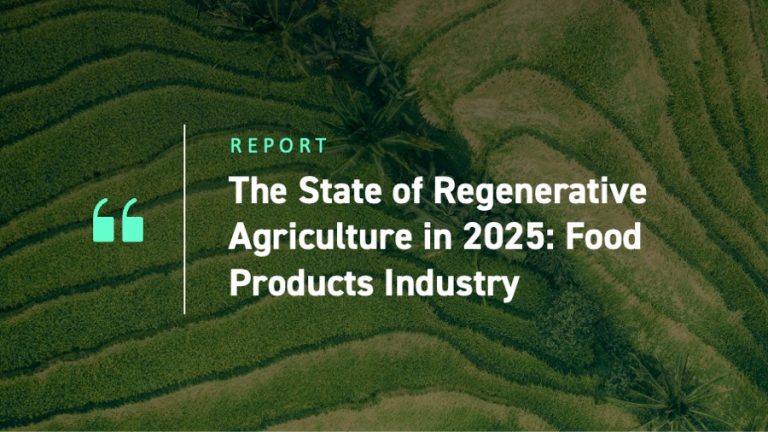The latest regulatory developments related to ESG and stewardship worldwide.
This monthly bulletin produced by ISS STOXX’s Regulatory Affairs & Public Policy group provides a review of regulatory developments that may be relevant to investors and companies.

IOSCO
International Organization of Securities Commissions (IOSCO) Chair Gives Keynote Address at IFRS Sustainability Symposium
On February 22, IOSCO Board Chair Jean-Paul Servais gave a keynote address at the IFRS Sustainability Symposium, discussing IOSCO’s endorsement of ISSB’s first sustainability disclosure standards and praising international adoption of the standards. Jean-Paul Servais also affirmed that “IOSCO is committed to collaborating with the ISSB and other global stakeholders to deliver a sound capacity building program to support the wider roll-out of sustainability disclosures.”
SBTi
SBTi Releases Reports on Design and Implementation of Beyond Value Chain Mitigation
On February 28, the Science Based Targets initiative (SBTi) released two new reports to aid the design and implementation of beyond value chain mitigation (BVCM) strategies. BVCM strategies do not affect companies’ Scopes 1, 2, or 3 emissions; they are another method to allow companies to “help accelerate the global net-zero transformation by enabling other economic and social actors to avoid, reduce or remove GHG emissions.” The first report – the “Above and Beyond” report – explores the creation, functionality, and implementation of BVCM strategies; meanwhile, the second report – the “Raising the Bar” report – explores barriers and incentives to the adoption of BVCM strategies.

Japan
Japanese Ministry of Environment and World Business Council Announce Collaboration on Global Circularity Protocol
The Japanese Ministry of Environment and the World Business Council for Sustainable Development announced their collaboration in developing the Global Circularity Protocol during the 6th UN Environment Assembly by signing a Memorandum of Cooperation. The announcement affirmed the continued cooperation on the Protocol that aims to promote circular business models globally through providing companies with a standard Corporate Performance Accountability System (CPAS) for Circularity; harmonizing circularity methodologies; adding accounting metrics for corporate-level circularity performance; and developing Science-Based Targets for Circularity. Simultaneously, the Protocol also aims to guide governments on regulation frameworks that would promote circularity.
Singapore
Deputy Prime Minister of Singapore Affirms Commitment to Combatting Climate Change at NUS Sustainable and Green Finance Institute’s Sustainability Summit
In his remarks on March 21 at the National Union of Singapore Sustainable and Green Finance Institute’s (SGFIN’s) Sustainability Summit, Mr. Heng Swee Keat, the Deputy Prime Minister of Singapore and the Coordinating Minister for Economic Policies, reaffirmed Singapore’s commitment to a Net-Zero-by-2050 target. The Deputy Prime Minister emphasized Singapore’s Green Plan 2030 – a sustainable development roadmap – as well as efforts by the Singapore Exchange to progressively introduce “mandatory requirements for climate-related disclosures as part of sustainability reporting by Singapore-listed companies.” The Deputy Minister also stated that the government is considering policy innovations, including carbon pricing, to promote sustainability.
South Korea
Korean FSC Holds Meeting with Investors to Discuss the Korean Value-up Program
On March 14, the Korean Financial Services Commission (FSC) held a meeting with 10 large institutional investors to reveal and promote efforts to improve investor participation in the Korean Value-up Program. The Value-up Program aims to increase corporate value and address the ‘Korean discount’ — a phenomenon where South Korean companies tend to have lower valuations than global counterparts due to geopolitical and governance reasons — through three main principles. The third principle focuses on “promoting shareholder values in corporate management”; the Program recommends achieving this goal through promoting shareholder-friendly corporate practices. Concurrently, the Korean Stewardship Code for Institutional Investors has been updated to encourage investors to engage with companies and promote voluntary measures in line with the Program; one such amendment to the Code requires investors to actively monitor how companies are attempting to implement the Program. Lastly, the FSC revealed in its meeting with investors details about the new Value-up Index being developed by the KRX in alignment with the Program.
Korean FSC Holds Meeting with Heads of Major Commercial Banks to Discuss Policies Intended to Boost Climate Finance
The Chairman of the FSC, as well as other government officials, met with the heads of major commercial banks to promote policies intended to boost climate finance. The FSC told banks that, amidst the challenges presented by climate change, the role of banks in the transition to a low-carbon economy will be enhanced. The FSC’s new initiatives aim to funnel investment from major financial institutions and venture capital firms to renewable and clean energy industries and climate technology. During the meeting, the Korean Ministry of Environment announced new low-carbon measures, including upgrading the Korean Green Taxonomy (K-Taxonomy); increasing green investment to as much as KRW30 trillion by 2027; and making improvements to South Korea’s emissions trading scheme.
Malaysia
Securities Commission Malaysia Releases Draft Governance Code for MSMEs
The Securities Commission Malaysia (SC) is seeking feedback on their draft Governance Code for Micro-, Small, and Medium-sized Enterprises (MSMES). The Small and Medium-Sized Enterprises (SMEs) Governance Working Group developed the Code to promote good governance practices among MSMES, in alignment with the 12th Malaysia Plan and the National Entrepreneurship Policy 2030. Complementing MSME guidance in the Simplified ESG Disclosure Guide and the ESG Quick Guide, the voluntary Code gives size-proportionate recommendations on good governance practices, and proper accountability mechanisms for the management of sustainability risks and opportunities; the recommendations of the Code are aligned with the principles of the Malaysian Code on Corporate Governance.
Bursa Malaysia to Serve as Chair on Stock Exchange Collaboration to Develop ASEAN-Interconnected Sustainability Ecosystem
On February 15, Bursa Malaysia, the Indonesia Stock Exchange (IDX), the Stock Exchange of Thailand (SET), and the Singapore Exchange (SGX Group) announced their collaboration on the development of the ASEAN-Interconnected Sustainability Ecosystem (ASEAN-ISE), with Bursa Malaysia serving as Chair. The exchanges aim “to advance ASEAN’s sustainable development through the implementation of common ESG metrics in their respective data infrastructures.” Each of the participating exchanges has committed to adopting and implementing the “ASEAN Exchanges Common ESG Metrics” when they are fully developed. The primary goals of the exchanges’ collaboration are creating an integrated ESG ecosystem; enabling exchanges to achieve economies of scale with fit-for-purpose efficiency solutions; and empowering exchanges to maximize the business value of ESG-compliant companies, including through requiring quality disclosures, connecting supply chains to ESG-oriented investment capital, and strengthening the infrastructure needed for cross-border trade flows.
Australia
ASIC Publishes Article for Small Businesses on Impact of Mandatory Climate Disclosure
The Australian Securities & Investments Commission (ASIC) published an article informing small businesses of upcoming climate disclosure regulation in Australia and how it may impact them. The Australian government has proposed introducing regulation that would mandate climate disclosure for financial institutions, large businesses, and businesses that meet two of the following criteria: has a consolidated revenue of A$50 million or more; has consolidated gross assets of A$25 million or more; and has 100 or more employees. Small businesses will be subject to certain reporting requirements through the Scope 3 reporting requirements of large businesses, provided that these requirements do not impose undue costs. ASIC also provided small businesses with guidance on how to avoid greenwashing charges based on false or misleading reporting or marketing claims.
ASIC and APRA Release Final Rules and Guidance for Implementation of Financial Accountability Regime
ASIC and the Australian Prudential Regulation Authority (APRA) released the final rules and guidance to aid the implementation of their Financial Accountability Regime (FAR). FAR aims to “improve the risk and governance cultures” in key financial industries by imposing a stronger accountability framework for regulated entities in banking, insurance, and superannuation, as well as relating to directors and executives within those industries. The latest guidance follows a public consultation and aims to clarify key regulatory and transitionary provisions.

European Union
Council Approves Corporate Sustainability Due Diligence Directive
After long delays due to disagreements between EU member states, the Council of the European Union approved the Corporate Sustainability Due Diligence Directive (CSDDD) on March 15. The legislation differs from the version on which the Council and Parliament had previously reached a provisional agreement. The CSDDD now has a reduced scope; the employee threshold for mandatory reporting has been raised to 1000 employees, while the revenue threshold has been increased to EUR 450 million.
Council Approves New Conclusions on Green Diplomacy
The Council has approved new conclusions emphasizing the EU’s focus on a just, green transition and on increasing global cooperation to support transitionary efforts. In its conclusions, the Council emphasized the need to develop more ambitious Nationally Determined Contributions, set new climate finance goals, and support global methane emission and energy sector transition targets.
EFRAG Releases Second Set of ESRS Technical Explanations
On March 1, the European Financial Reporting Advisory Group (EFRAG) released its second batch of technical explanations on the reporting requirements of the European Sustainability Reporting Standards (ESRS). In the document, EFRAG addresses questions, clarifications, and concerns brought up by stakeholders; EFRAG’s answers take the form of either Implementation Guidance, which is subject to public feedback, or Explanations, which are not subject to public feedback.
Germany
On March 22, the Federal Ministry of Justice published for comment its draft legislation for transposition of the Corporate Sustainability Reporting Directive (CSRD). Comments are due by April 19.
German SAFC Issues Report Analyzing Collaborative Engagement on ESG Topics
The German Government’s Sustainable Finance Advisory Committee (SAFC) issued a report providing analysis and recommendations on collaborative engagement on ESG topics. The SAFC found that institutional investors’ collective engagement with companies, through engagements and proxy voting, on ESG topics can be an effective means of driving companies towards more sustainable ends; the SAFC, however, also identified legal, antitrust-related hurdles to “effective cooperation” between investors to maximize the effectiveness of engagements. Consequently, the SAFC recommended that legal measures be taken by the German government to clarify permitted coordination between investors on collaborative engagement.
France
AMF Publishes Education Guide on Companies’ Climate Transition Plans
In February, the French Financial Market Authority (AMF) published an educational guide on corporate climate transition plans. Prompted by the upcoming CSRD-related requirements to publish transition plans, the guidance aims to clarify questions regarding several key themes and topics. Primarily, the guidance covers how to address key challenges of reporting on transition plans; the importance of short- and medium- term targets; the presentation of decarbonization levels; the workforce assigned to the transition plans; and related governance and monitoring.
United Kingdom
HM Treasury Confirms Regulation of ESG Ratings in Spring Budget
On March 6, the U.K. government published its Spring Budget 2024. In the budget, HM Treasury confirmed that “the government will regulate providers of Environmental, Social, and Governance (ESG) ratings to users within the U.K. ESG ratings providers will be brought into the regulatory perimeter of the Financial Conduct Authority [FCA],” where these assessments of ESG factors are used for investment decisions and influence capital allocation. A full consultation response and legislative steps will follow later this year. In 2023, HM Treasury consulted on the scope of such a regulatory regime. It is up to HM Treasury to introduce legislation to amend and expand the regulatory perimeter; the FCA, as the regulator for markets, would then set firm-facing requirements in its rules.
FCA “Dear CEO” Letter Speaks to Updated Supervisory Strategy
On March 1, the Financial Conduct Authority (FCA) published a “Dear CEO” letter to asset managers and alternative portfolios, providing an update on the FCA’s supervisory strategy. Among other themes, the letter highlights “change management,” as firms prepare for regulatory changes alongside other challenges. The letter notes that there is a risk that firms may not be adequately resourced to handle a “considerable amount of current and planned regulatory change” impacting the sector, including the Sustainability Disclosure Requirements (SDR) and investment labels regime.
FCA Publishes Results of Wholesale Data Market Study
On February 29, the FCA released the findings of its wholesale data market study. The FCA study covered competition in three markets: credit ratings data, benchmarks, and market data vendor services. FCA concluded that there are areas in all three sectors where “competition does not work well,” but ruled out “significant intervention” because of “potential unintended consequences, such as on the availability and quality of data, in a market relied upon by investors worldwide.”
FRC Announces Review of U.K. Stewardship Code
On February 27, the Financial Reporting Council (FRC) announced it is undertaking a fundamental review of the U.K. Stewardship Code 2020 (the Code) to “ensure it supports growth and the U.K.’s competitiveness.” This follows publication of the revised U.K. Corporate Governance Code. Among other topics, the review will focus on the extent to which the Code supports long-term value creation through appropriate investor-issuer engagement that drives issuers’ prospects and performance; creates reporting burdens on issuers as well as Code signatories; and has led to any unintended consequences, such as short-termism in targets and outlook for issuers. The review will be done in three phases, beginning with targeted outreach which has already begun.
FRC Launches Market Study on Sustainability Assurance Services Market in U.K.
FRC announced on March 21 that it is launching its first market study to examine the sustainability assurance services market in the U.K. The study covers independent assurance over sustainability information disclosed by U.K. companies. The study will explore choice, quality, and competition in the market; capacity constraints and barriers to entry; potential impacts from international regulation; and the interplay between sustainability assurance and statutory audit markets in the U.K.
U.K. Government Announces Plans to Simplify Certain Non-Financial Reporting Requirements
After concluding its Non-Financial Reporting Review, the U.K. Government announced that it will simplify certain non-financial reporting requirements. As a means of reducing compliance cost, the government’s initiative removes certain “duplicative and outdated reporting requirements from the Directors’ Report to reduce overlap,” streamlines remuneration reporting that was “not providing useful information,” and exempts more SME companies from reporting requirements.
U.K. Pensions and Lifetime Savings Association Updates Stewardship and Voting Guidelines
The U.K.’s Pensions and Lifetime Savings Association (PLSA) published its updated Stewardship & Voting Guidelines for 2024, advising pension fund trustees and their investment managers, as well as other institutional investors. The updated guidance notes the policy focus of the U.K. government and provides further guidance on topics such as sustainability, biodiversity, and social factors.
CMA Publishes Second Informal Guidance under Its Green Agreements Guidance
On March 19, the U.K. Competition & Markets Authority (CMA) published its second informal guidance under its Green Agreements Guidance. The CMA provided guidance to WWF-U.K. and five U.K. supermarkets on moving forward with a joint commitment to help reduce GHG emissions in their supply chains by increasing the number of suppliers setting science-based, net zero targets by an agreed date. See also the 2023 CMA guidance.

Canada
CSSB Releases First Proposed Canadian Sustainability Disclosure Standards
The Canadian Sustainability Standards Board (CSSB) released its first proposed Canadian Sustainability Disclosure Standards (CSDS 1 and 2). CSDS 1 & 2, which aim to mandate and standardize sustainability-related disclosures in Canada, are aligned with ISSB’s IFRS 1 & 2 disclosure standards; however, CSSB also proposes to include Canada-specific modifications, effective dates, and transition relief proposals in the disclosure standards. CSSB is seeking feedback on its proposal. For CSDS 1 and 2 to become mandatory Canadian securities legislation, they must be incorporated into a Canadian Securities Administrators (CSA) rule. The CSA anticipates releasing a revised rule for comment following the conclusion of the CSSB consultation and finalization of standards.
CSA Publishes Guidance on ESG-Related Fund Disclosures
On March 7, CSA published updated guidance on ESG-related investment fund disclosure. The revised guidance does not affect the guidance released by CSA in January 2022; rather, it addresses matters not discussed in the 2022 text. The latest guidance sets disclosure level expectations based on the extent to which ESG factors are considered in a fund’s investment process; this includes guidance addressing disclosure for funds whose objectives do not reference ESG factors but use ESG strategies. The guidance addresses disclosure, fund names, investment objectives and strategies, risk disclosure, marketing rules, and sales communications.
United States
SEC Climate Rule Faces Legal Challenges after Being Finalized Earlier This Month
On March 6, the SEC voted 3:2 to adopt a final rule requiring climate-related disclosures by domestic and foreign registrants in their registration and periodic statements and reports. For more information about this rule, see the ISS Corporate post, “SEC Adopts Climate Disclosure Rule: Key Takeaways for Corporates.”
On March 15, prompted by a series of legal challenges, the U.S. Court of Appeals for the Fifth Circuit granted an administrative stay of the rule, effectively halting the rule temporarily. In all, petitioning against the rule are 25 states’ attorneys general, several companies, and corporate industry groups who are arguing, among other points, that the SEC has overstepped its statutory authority and that the rules amount to an undue burden on and micromanaging of the impacted companies. Also suing the SEC is the Sierra Club, a grassroots environmental organization, that contends that the final rules arbitrarily remove key provisions from the proposed rule, including mandatory Scope 3 emissions reporting.
On March 21, following a lottery process, the U.S. Court of Appeals for the Eighth Circuit was selected as the venue for hearing the consolidated nine lawsuits. Following this selection, the 5th Circuit dissolved its administrative stay.
Brazil
BNDES and GFANZ Announce Plan to Build Platform for Accelerated Decarbonization
On February 26, Brazil’s National Bank for Economic and Social Development (BNDES) and the Glasgow Financial Alliance for Net Zero (GFANZ) signed letters of interest in a joint project to expand financing in projects that would help decarbonize the Brazilian economy. The joint initiative aims to support data and planning, and mobilize national and international financing, for projects that help Brazil’s green growth meet the goals of the Paris Agreement.
By:
Noam Cherki, Associate, Regulatory Affairs & Public Policy, ISS STOXX
Hugo Gallagher, Senior Associate, Regulatory Affairs & Public Policy, ISS STOXX
Karina Karakulova, Director of Regulatory Affairs & Public Policy, ISS STOXX




